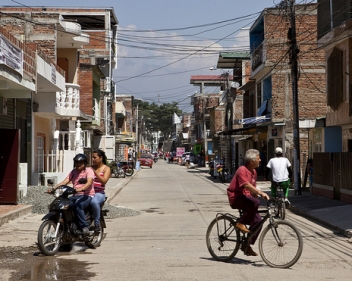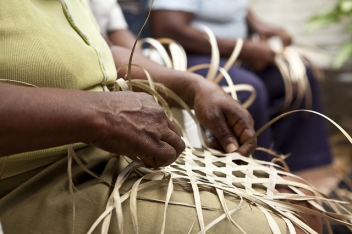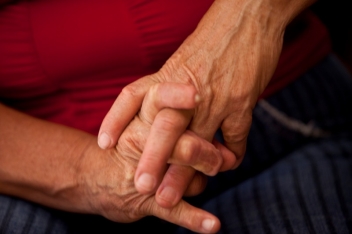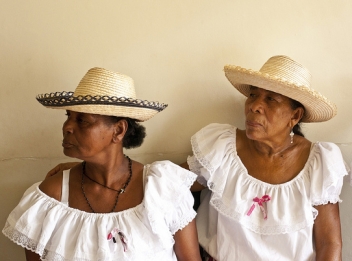 I was over the moon to hear that my first trip with HelpAge would be to “mi querida Colombia!”
I was over the moon to hear that my first trip with HelpAge would be to “mi querida Colombia!”
With Colombia, initial thoughts turn to Mafioso-style drug barons, kidnappings and a brutal armed conflict that fuels the world’s drug trade – and you wouldn’t be wrong.
In 2002 when I reported for another NGO, more than 10 families were forced to flee their homes every hour. Medellin, known as the city of the eternal spring for its temperate climate, was re-named the city of eternal gunfire.
Things have changed in the last ten years. Largely due to the right-wing stance of former President Uribe who, equipped with $1 billion from the USA, has weakened the rebel’s stronghold.
Places I couldn’t previously visit have now opened up. But there are still massive steps to take in reparation, particularly for the indigenous and Afro-Colombian population who are disproportionately affected: they continue to be forced off land, their communities used as human shields, or falsely killed.
During Uribe’s presidency, a controversial scheme meant that in return for killing illegally armed actors, the Colombian armed forces could receive rewards such as increased salaries and promotions. As a result, there were some cases of innocent civilians killed by the armed forces, but falsely accused of being members of illegal armed groups.
Hope and resilience
Despite having the second largest displaced population in the world after Sudan, Colombia also has a sunnier side. Warm, hospitable people, who will feed you a hearty meal, Bandeja Paisa (google it and you’ll see what we ate).
We were here to interview potential spokespeople for Age UK’s Sponsor a Grandparent and Raise a Grandchild fundraising schemes. This time in the poorest areas of the city of Cali, a place known as Aguablanca (white water).
We heard heart-warming stories of how traditional  basket weaving from Afro-Colombian coastal communities was being kept alive thanks to our partner Fundación Paz y Bien (Peace and Wellbeing Foundation).
basket weaving from Afro-Colombian coastal communities was being kept alive thanks to our partner Fundación Paz y Bien (Peace and Wellbeing Foundation).
It has a range of social-legal projects and psycho-social therapy activities for older people, especially those who have been displaced.
Melchora, a 77-year-old lady almost sheds tears as she shares with us the ‘call and response’ sayings that the Afro-Colombian women often make as a group when weaving together. [Call: “My tree does not produce fruit like it did before.” Response: “My love does not love me as he did before.”]
Melchora said these songs are a tradition in the coastal communities where she was displaced from and that the call and response sayings are used to motivate the group if the work is hard. The weekly basket-weaving sessions are vital to the psychological wellbeing of those who have been displaced.
Melchora says ‘It’s important that I don’t forget what I used to do in the village. The other people here act as a social support. You can forget about your problems in the places where you came from.’
We took part in the Fundación’s ‘Jueves de Paz’ meetings (Thursdays of Peace) which is a weekly meeting where newly displaced people who have arrived in Aguablanca are introduced and welcomed by other displaced people from their own region. Fanny, the Fundación’s lawyer, also updates people on the latest laws and the application process to access immediate emergency aid from government services. It is also a chance for displaced people to raise any of their own concerns, either publically or privately and get free  legal advice.
legal advice.
Here we first met , a woman whose suffering had left irreversible scars on her life and demeanour, but who has also been cared for through the Fundación’s counselling services. Her husband disappeared as a result of the internal armed conflict and she suffered serious sexual violence. Cecilia fled and reached Aguablanca by canoe, bus and walking – at the mercy of strangers for free passage. Ten years later, she still doesn’t know if her husband is dead or alive.
The Fundación is currently trying to help Cecilia make an application to regain her land and help her get a government subsidy to buy her own house. At last, at the age of 60, she may have a place to call home again.
Music group therapy
 We also have a recording of the VERY LOUD rehearsal of an older people’s music group, set up by the Fundación (think Buena Vista Social Club). Here we met Inocencio and Corina, an older couple who can still belt out a good tune despite the fact that they have lost everything through their displacement.
We also have a recording of the VERY LOUD rehearsal of an older people’s music group, set up by the Fundación (think Buena Vista Social Club). Here we met Inocencio and Corina, an older couple who can still belt out a good tune despite the fact that they have lost everything through their displacement.
We visited them in their home, but when we went back a few days later to take more photos, our trusty driver/body guard saw trouble brewing in the form of a machete-armed gang heading up the street.
He turned the car around immediately. But it gave us a clear idea of what Inocencio and Corina have to live with and why the weekly music group rehearsals are such a release.
Corina says “I feel good when I participate. I feel a bit calmer and at peace with myself. I’d feel lonely and bored without it because I don’t have many friends. So this music activity is not only for singing, it’s for talking to other people.’
We also saw the entrepreneurial spirit of the poorest Colombians in action through the work of our partner Coomostaza Cooperative. The cooperative supports people who previously had a business before their displacement to set it up again through small loans and business training. It offers a savings account to help people plan ahead and helps people with skills such as accounting. It also prevents people from resorting to a ‘gota-a-gota’ – an illegal, money-lending scheme which sees interest rates rocket to 40% or more.
Thanks to support from Coomostaza, Emma Maria, both a grandmother and a wholesaler, can expand her garbage-supplies business and also start up a shop from the front of her house.
To hear the full story on our partner’s work in Colombia, keep up to date with Age UK’s Sponsor a Grandparent and Raise a Grandchild.
